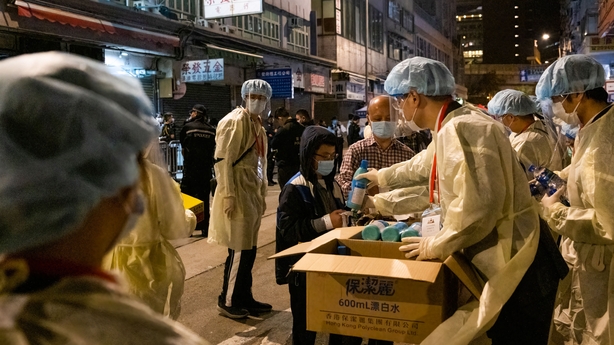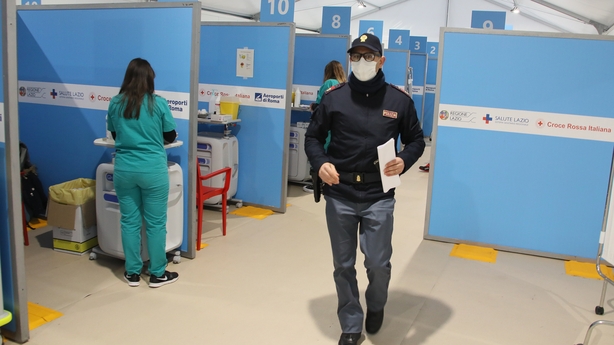South African scientists are to discuss a laboratory study that suggests the dominant local coronavirus variant may reduce antibody protection from the Pfizer/BioNTech vaccine by two-thirds, a health ministry spokesman said.
"I do know that our scientists will be meeting to discuss it(the Pfizer study) and they will advise the minister," spokesman Popo Maja said.
"We are not going to be releasing a statement until advised by our scientists. We will also be guided by the regulator."
The lab study found the vaccine was still able to neutralise the virus and there is not yet evidence from trials in people that the variant reduces vaccine protection, Pfizer/BioNTech said.
Still, they are making investments and talking to regulators about developing an updated version of their mRNA vaccine or a booster shot, if needed.
For the study, scientists from the companies and the University of Texas Medical Branch developed an engineered virus that contained the same mutations carried on the spike portion of the highly contagious coronavirus variant first discovered in South Africa, known as B.1.351.
The spike, used by the virus to enter human cells, is the primary target of many Covid-19 vaccines.
Researchers tested the engineered virus against blood taken from people who had been given the vaccine, and found a two-thirds reduction in the level of neutralising antibodies compared with its effect on the most common version of the virus prevalent in US trials.
Their findings were published in the New England Journal of Medicine.
Because there is no established benchmark yet to determine what level of antibodies are needed to protect against the virus, it is unclear whether that two-thirds reduction will render the vaccine ineffective against the variant spreading around the world.
However, University of Texas Medical Branch professor and study co-author Pei-Yong Shi said he believes the Pfizer vaccine will likely be protective against the variant.
"We don't know what the minimum neutralising number is. We don't have that cutoff line," he said, adding that he suspects the immune response observed is likely to be significantly above where it needs to be to provide protection.
That is because in clinical trials, both the Pfizer/BioNTech vaccine and a similar shot from Moderna conferred some protection after a single dose with an antibody response lower than the reduced levels caused by the South African variant in the laboratory study.
Even if the concerning variant significantly reduces effectiveness, the vaccine should still help protect against severe disease and death, he noted. Health experts have said that is the most important factor in keeping stretched healthcare systems from becoming overwhelmed.
Pfizer and BioNTech said they were doing similar lab work to understand whether their vaccine is effective against another variant first found in Brazil.
Researchers urge delay in administering Pfizer vaccine's second dose
Researchers have urged governments to delay administering the second dose of Pfizer Covid-19 vaccine, which they said had an efficacy of 92.6% after the first dose.
The researchers, Danuta Skowronski and Gaston De Serres ,said their findings were derived from Pfizer's documents submitted to the US Food and Drug Administration.
These findings were also similar to the first-dose efficacy of 92.1% reported for Moderna mRNA-1273 vaccine, they said in their letter published in the New England Journal of Medicine.
They cautioned that there may be uncertainty about the duration of protection with a single dose, but said that the administration of the second dose a month after the first provided "little added benefit in the short term".
"Given the current vaccine shortage, postponement of the second dose is a matter of national security that, if ignored, will certainly result in thousands of Covid-19–related hospitalisations and deaths this winter in the United States,"the authors warned.
In its response, Pfizer said that alternative dosing regimens of its vaccine had not yet been evaluated and that the decision to do that resides with the health authorities.
"We at Pfizer believe that it is critical for health authorities to conduct surveillance on implemented alternative dosing schedules to ensure that vaccines provide the maximum possible protection," it added.
Hong Kong approves China's Sinovac vaccine
Hong Kong has formally approved China's Sinovac vaccine for emergency use with the roll-out starting on 26 February, the city's health secretary said.
Sophia Chan said the vaccine met the "safety, efficacy and quality requirements specified in Hong Kong emergency situations" and that the benefits outweighed the risks.
Ms Chan, who was speaking at a news briefing, addressed what she called "doubts" about vaccine safety and said all vaccines authorised by the government have been assessed to be safe by experts.
"The vaccines give us hope of returning to normal lives."
A Hong Kong government advisory panel on Covid-19 vaccines said on Tuesday it recommended Sinovac vaccine for emergency use.

The recommendation came after the government exempted Sinovac from publishing results of its third phase clinical trials in medical journals due to the "urgency" for vaccination.
The BioNTech vaccine - the first vaccine approved by Hong Kong's Health department - was required to have results published in a medical journal before being examined by the advisory panel on Covid-19 vaccines.
Residents will be able to get vaccinated at 29 centres across the city with five offering Sinovac and 24 offering BioNtech vaccines.
Priority will be given to health workers, over 60s and those working in cross-border transportation.
Dutch MPs give new curfew law the green light
Dutch lawmakers have approved a curfew law which was hastily introduced by the government to circumvent a court order that the measure must be lifted.
The nightime curfew began on 23 January and runs every night from 9:00pm to 4:30am. The government is due to decide next week whether to extend it past 2 March.
The law will now go to the senate on tomorrow, the same day as an appeals court hears the government's bid to overturn the lower court's ruling.
Prime Minister Mark Rutte said his government would await the court's decision, before bringing into effect the law to reinstate the curfew if the government loses.
"We are fighting one of the country's biggest post-war crises. It directly affects our safety, directly affects our public health and thousands of people have died," Rutte told MPs during a heated debate.
"We believe the curfew is necessary," the Dutch premier said.
Rutte said he was "not optimistic" that the measure, the first since Nazi rule during World War II, would be eased soon.
A judge threw Rutte's virus policy into disarray on Tuesday by ruling that the government improperly evoked emergency laws and must end the curfew immediately.
An appeals court suspended that order later on Tuesday, allowing the curfew to stay in place pending the full hearing on Friday.
Draghi sets out plan to rebuild virus-hit Italy
Italian Prime Minister Mario Draghi has pledged to use "all means" to fight the coronavirus pandemic that has devastated Italy, and said it presented an opportunity for the country to rebuild as it did after World War II.
In his first speech since taking office, the former European Central Bank chief listed the pandemic as his top priority of a long list of issues requiring urgent attention.
The 73-year-old, parachuted in after the previous centre-left government collapsed, has been dubbed "Super Mario" since promising to do "whatever it takes" to save the euro during the 2012 debt crisis.
His new government involves a wide range of parties from leftists to Silvio Berlusconi's Forza Italia, the populist Five Star Movement (M5S) and Matteo Salvini's eurosceptic, far-right League.
With rising concern about the spread of new coronavirus variants, which have sparked a series of mini-lockdowns in towns across Italy, Mr Draghi emphasised the importance of speeding up vaccinations.

After a strong start in late December, the campaign has slowed, with only 1.3 million people out of a population of 60 million immunised so far.
And after almost 450,000 people lost their jobs last year, mostly women and young people, Mr Draghi also underscored the importance of protecting all workers - but said "it would be a mistake" to also save all companies from insolvency.
Another immediate challenge is drawing up a plan to spend what Mr Draghi has previously called the "extraordinary resources" offered by the EU.
Italy expects to receive more than €200bn from the EU's post-coronavirus recovery fund, but in return, it is expected to commit to potentially difficult or unpopular reforms.

